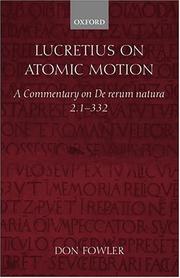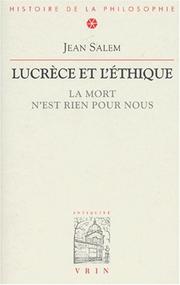| Listing 1 - 10 of 57 | << page >> |
Sort by
|
Book
Abstract | Keywords | Export | Availability | Bookmark
 Loading...
Loading...Choose an application
- Reference Manager
- EndNote
- RefWorks (Direct export to RefWorks)
Book
ISBN: 3631308493 Year: 1996 Volume: 102 Publisher: Frankfurt am Main New York Peter Lang
Abstract | Keywords | Export | Availability | Bookmark
 Loading...
Loading...Choose an application
- Reference Manager
- EndNote
- RefWorks (Direct export to RefWorks)
Agriculture in literature. --- Didactic poetry, Latin --- History and criticism. --- Virgil. --- Lucretius Carus, Titus. --- Lucretius Carus, Titus --- Influence. --- Rome --- In literature. --- Agriculture in literature --- History and criticism --- Lucrèce --- Lukrez --- Lukrecjusz Karus, Tytus --- Lukret︠s︡iĭ Kar, Tit --- Lucrezio, Tito --- Lucrèce --- Lucrez --- Lucrecio Caro, T. --- Caro, T. Lucrecio --- Carus, Titus Lucretius --- Lucretius --- Lucrezio Caro, Tito --- Lucrecio --- Lucreti Cari, T. --- Lucreci --- לוקרציוס קרוס, טיטוס --- Lucrezio

ISBN: 0199243581 9780199243587 Year: 2002 Publisher: Oxford: Oxford university press,
Abstract | Keywords | Export | Availability | Bookmark
 Loading...
Loading...Choose an application
- Reference Manager
- EndNote
- RefWorks (Direct export to RefWorks)
Lucretius Carus, Titus. --- Lucretius Carus, Titus --- Lukrecjusz Karus, Tytus --- Lukret︠s︡iĭ Kar, Tit --- Lucrezio, Tito --- Lucrèce --- Lucrez --- Lucrecio Caro, T. --- Caro, T. Lucrecio --- Carus, Titus Lucretius --- Lucretius --- Lucrezio Caro, Tito --- Lucrecio --- Lucreti Cari, T. --- Lucreci --- לוקרציוס קרוס, טיטוס --- Lucrèce --- Lukrez --- Lucretius Carus, Titus. - De rerum natura. - Book 2. - Lines 1-332.
Book
ISBN: 2130368239 9782130368236 Year: 1981 Publisher: Paris: PUF,
Abstract | Keywords | Export | Availability | Bookmark
 Loading...
Loading...Choose an application
- Reference Manager
- EndNote
- RefWorks (Direct export to RefWorks)
Didactic poetry, Latin --- History and criticism --- Lucretius Carus, Titus --- Lukrecjusz Karus, Tytus --- Lukret︠s︡iĭ Kar, Tit --- Lucrezio, Tito --- Lucrèce --- Lucrez --- Lucrecio Caro, T. --- Caro, T. Lucrecio --- Carus, Titus Lucretius --- Lucretius --- Lucrezio Caro, Tito --- Lucrecio --- Lucreti Cari, T. --- Lucreci --- לוקרציוס קרוס, טיטוס --- History and criticism. --- Lucretius Carus, Titus. --- Lucrèce --- Lukrez --- Didactic poetry, Latin - History and criticism --- Lucretius Carus, Titus - De rerum natura
Book
ISBN: 9782840506775 2840506777 Year: 2010 Volume: 27 Publisher: Paris: Presses de l'Université Paris-Sorbonne,
Abstract | Keywords | Export | Availability | Bookmark
 Loading...
Loading...Choose an application
- Reference Manager
- EndNote
- RefWorks (Direct export to RefWorks)
L'épicurisme et son illustration romaine sous la plume poétique de Lucrèce sont des objets d'étude qui connaissent depuis quelques années un regain d'intérêt. Mais si Lucrèce est avant tout étudié pour sa philosophie et pour le rôle imparti à la forme poétique, l'étude de la tradition de son poème reste encore embryonnaire. Dans un tel contexte, ce volume, qui réunit les études de spécialistes de philosophie antique, mais aussi d'historiens des sciences ou de la littérature, s'est donné pour objet d'interroger les conditions de possibilité d'une nouvelle vie pour le De rerum natura au seuil de la modernité. Les contributions réunies mettent en évidence le caractère décisif du vecteur philologique dans la redistribution de la pensée lucrétienne, les éditeurs se positionnant de manière équivoque en récusant une pensée inconciliable avec le cadre culturel chrétien, tout en soulignant et en explicitant les thèses les plus scandaleuses du matérialisme. Cette "promotion distanciée" de l'épicurisme romain, faite de fascination et d'hostilité, entraîne de nombreux phénomènes insoupçonnés : comment Lucrèce trouve une nouvelle dignité dans des querelles poétiques, voire linguistiques ; comment le christianisme, qui semble le condamner définitivement, peut trouver en son sein aussi bien des concepts qu'une religiosité capables d'être articulés avec la Révélation divine ; combien les facteurs historiques peuvent déterminer l'interprétation et le degré de légitimité de l'anthropologie lucrétienne ; combien la fragmentation du poème en passages fameux peut donner lieu à des hybridations parfaitement inattendues. Parfois retourné contre lui-même, Lucrèce sert aussi à consolider les pensées qui lui sont étrangères, avec lesquelles il aurait pu paraître inconciliable. Lucrèce devient ainsi un modèle influent, mais hors de ses propres murs, par dérivation accidentelle, en vertu de la faculté de son texte à proposer des réponses ou des prolongements aux systèmes privilégiés par la pensée de la Renaissance. Transmise le plus souvent au prix de mutilations et de métamorphoses importantes, la renaissance de Lucrèce se prolonge au hasard du clinamen des idées, survivant hors de ses limites pour servir une nouvelle représentation de la Nature, peut-être telle qu'il ne l'a jamais comprise.
Renaissance --- Lucretius Carus, Titus --- Influence --- Latin poetry and philosophy --- 1st century --- Criticism --- Lucretius Carus, Titus. --- Lucrèce --- Lukrez --- Lukrecjusz Karus, Tytus --- Lukret︠s︡iĭ Kar, Tit --- Lucrezio, Tito --- Lucrèce --- Lucrez --- Lucrecio Caro, T. --- Caro, T. Lucrecio --- Carus, Titus Lucretius --- Lucretius --- Lucrezio Caro, Tito --- Lucrecio --- Lucreti Cari, T. --- Lucreci --- לוקרציוס קרוס, טיטוס --- Lucrezio --- Lucretius Carus, Titus - De rerum natura

ISBN: 2711610314 9782711610310 Year: 1990 Publisher: Paris: Vrin,
Abstract | Keywords | Export | Availability | Bookmark
 Loading...
Loading...Choose an application
- Reference Manager
- EndNote
- RefWorks (Direct export to RefWorks)
Lukrecjusz Karus, Tytus --- Lucrèce --- Lucretius Carus, Titus. --- Lukrez --- Lucretius Carus, Titus --- Ethics --- Philosophy, Ancient --- Morale --- Philosophie ancienne --- Epicurus --- Lukret︠s︡iĭ Kar, Tit --- Lucrezio, Tito --- Lucrèce --- Lucrez --- Lucrecio Caro, T. --- Caro, T. Lucrecio --- Carus, Titus Lucretius --- Lucretius --- Lucrezio Caro, Tito --- Lucrecio --- Lucreti Cari, T. --- Lucreci --- לוקרציוס קרוס, טיטוס --- Lucrezio
Book
ISBN: 1474416551 1474430449 1474416543 9781474416542 9781474430449 9781474416535 1474416535 9781474416559 1474432301 Year: 2017 Publisher: Edinburgh : Edinburgh University Press,
Abstract | Keywords | Export | Availability | Bookmark
 Loading...
Loading...Choose an application
- Reference Manager
- EndNote
- RefWorks (Direct export to RefWorks)
Explores how Deleuze's thought was shaped by Lucretian atomism - a formative but often-ignored influence from ancient philosophy.
More than any other 20th-century philosopher, Deleuze considers himself an apprentice to the history of philosophy. But scholarship has ignored one of the more formative influences on Deleuze: Lucretian atomism. Deleuze's encounter with Lucretius sparked a way of thinking that resonates throughout all his writings: from immanent ontology to affirmative ethics, from dynamic materialism to the generation of thought itself. Filling a significant gap in Deleuze Studies, Ryan J. Johnson tells the story of the Deleuze-Lucretius encounter that begins and ends with a powerful claim: Lucretian atomism produced Deleuzianism.
Deleuze, Gilles, --- Lucretius Carus, Titus --- Lukrecjusz Karus, Tytus --- Lukret︠s︡iĭ Kar, Tit --- Lucrezio, Tito --- Lucrèce --- Lucrez --- Lukrez --- Lucrecio Caro, T. --- Caro, T. Lucrecio --- Carus, Titus Lucretius --- Lucretius --- Lucrezio Caro, Tito --- Lucrecio --- Lucreti Cari, T. --- Lucreci --- לוקרציוס קרוס, טיטוס --- Deleuze, G. --- Delëz, Zhilʹ, --- Dūlūz, Jīl, --- دولوز، جيل --- Criticism and interpretation. --- Delezi, Jier, --- HISTORY / Ancient / Rome. --- Lucrezio
Book
ISBN: 0823235823 0823246930 1282699083 9786612699085 082323861X 0823230686 082323066X 0823230678 Year: 2009 Publisher: Fordham University Press
Abstract | Keywords | Export | Availability | Bookmark
 Loading...
Loading...Choose an application
- Reference Manager
- EndNote
- RefWorks (Direct export to RefWorks)
The title of this book translates one of the many ways in which Lucretius names the basic matter from which the world is made in De rerum natura. In Lucretius, and in the strain of thought followed in this study, matter is always in motion, always differing from itself and yet always also made of the same stuff. From the pious Lucy Hutchinson’s all but complete translation of the Roman epic poem to Margaret Cavendish’s repudiation of atomism (but not of its fundamental problematic of sameness and difference), a central concern of this book ishow a thoroughgoing materialism can be read alongside other strains in the thought of the early modern period, particularly Christianity.A chapter moves from Milton’s monism to his angels and their insistent corporeality. Milton’s angels have sex, and, throughout, this study emphasizes the consequences for thinking about sexuality offered by Lucretian materialism. Sameness of matter is not simply a question of same-sex sex, and the relations of atoms in Cavendish and Hutchinson are replicated in the terms in which they imagine marriages of partners who are also their doubles. Likewise, Spenser’s knights in the 1590 Faerie Queene pursue the virtues of Holiness, Temperance, and Chastity in quests that take the reader on a path of askesis of the kind that Lucretiusrecommends and that Foucault studied in the final volumes of his history of sexuality.Although English literature is the book’s main concern, it first contemplates relations between Lucretian matter and Pauline flesh by way of Tintoretto’s painting The Conversion of St. Paul. Theoretical issues raised in the work of Agamben and Badiou, among others, lead to a chapter that takes up the role that Lucretius has played in theory, from Bergson and Marx to Foucault and Deleuze.This study should be of concern to students of religion, philosophy, gender, and sexuality, especially as they impinge on questions of representation.
English literature --- Sex in literature. --- Material culture in literature. --- Philosophy in literature. --- History and criticism. --- Lucretius Carus, Titus --- Influence. --- Lukrecjusz Karus, Tytus --- Lukret︠s︡iĭ Kar, Tit --- Lucrezio, Tito --- Lucrèce --- Lucrez --- Lukrez --- Lucrecio Caro, T. --- Caro, T. Lucrecio --- Carus, Titus Lucretius --- Lucretius --- Lucrezio Caro, Tito --- Lucrecio --- Lucreti Cari, T. --- Lucreci --- לוקרציוס קרוס, טיטוס --- Lucrezio

ISBN: 3515025693 9783515025690 Year: 1978 Volume: 39 Publisher: Wiesbaden: Steiner,
Abstract | Keywords | Export | Availability | Bookmark
 Loading...
Loading...Choose an application
- Reference Manager
- EndNote
- RefWorks (Direct export to RefWorks)
Poetry --- Classical Latin literature --- Lucretius Carus, Titus --- Latin language --- Metrics and rhythmics --- Versification --- -Classical languages --- Italic languages and dialects --- Classical philology --- Latin philology --- -Lukrecjusz Karus, Tytus --- Lukret︠s︡iĭ Kar, Tit --- Lucrezio, Tito --- Lucrèce --- Lucrez --- Lucrecio Caro, T. --- Caro, T. Lucrecio --- Carus, Titus Lucretius --- Lucretius --- Lucrezio Caro, Tito --- Lucrecio --- Lucreti Cari, T. --- Lucreci --- לוקרציוס קרוס, טיטוס --- Metrics and rhythmics. --- Versification. --- -Metrics and rhythmics --- -Versification --- -Lucrèce --- Lukrez --- Lucrèce --- Lukrecjusz Karus, Tytus --- Lucrezio --- Latin language - Metrics and rhythmics --- Lucretius Carus, Titus - Versification

ISBN: 2707302120 9782707302120 Year: 1978 Publisher: Paris: Les Éditions de Minuit,
Abstract | Keywords | Export | Availability | Bookmark
 Loading...
Loading...Choose an application
- Reference Manager
- EndNote
- RefWorks (Direct export to RefWorks)
Lucretius Carus, Titus --- Didactic poetry, Latin --- Philosophy, Ancient, in literature --- History and criticism --- -Philosophy, Ancient, in literature --- Latin didactic poetry --- Latin poetry --- Lukrecjusz Karus, Tytus --- Lukret︠s︡iĭ Kar, Tit --- Lucrezio, Tito --- Lucrèce --- Lucrez --- Lucrecio Caro, T. --- Caro, T. Lucrecio --- Carus, Titus Lucretius --- Lucretius --- Lucrezio Caro, Tito --- Lucrecio --- Lucreti Cari, T. --- Lucreci --- לוקרציוס קרוס, טיטוס --- Philosophy, Ancient, in literature. --- History and criticism. --- Lucretius Carus, Titus. --- Lucrèce --- Lukrez --- Didactic poetry, Latin - History and criticism --- Lucretius Carus, Titus - De rerum natura
| Listing 1 - 10 of 57 | << page >> |
Sort by
|

 Search
Search Feedback
Feedback About UniCat
About UniCat  Help
Help News
News